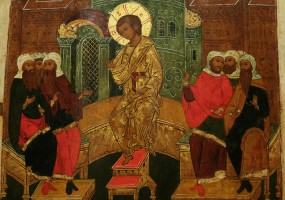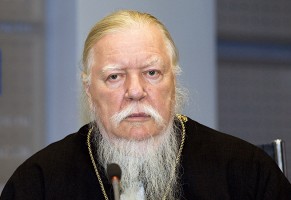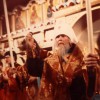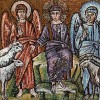 We all know that, beginning Wednesday of this past week, the Church began to sing the meaningful and touching troparion of the feast of Mid-Pentecost, which says: “At Mid-feast give Thou my thirsty soul to drink of the waters of piety.” This appeal of the Christian soul is clear to everyone – and especially in our terrible times, of course, when we hear not about the “waters of piety,” but rather about the waves of impiety that are pouring increasingly over the entire world and the entire human race. The thirsty Christian soul, under the pressure of this impiety, prays that the Lord would give it to drink of the waters of piety. The Gospel we heard today at the Liturgy comes, as it were, in response to this appeal. The Lord, as if coming out to meet the soul that calls out to Him in the troparion, says: Come unto Me, all ye that labour and are heavy laden, and I will give you rest (Mathew 11:28). You also know another moving passage from the Gospel, in which the Lord says: Take My yoke upon you, and learn of Me, for I am meek and lowly in heart: and ye shall find rest unto your souls. For My yoke is easy, and My burden is light (Matthew 11:29).
We all know that, beginning Wednesday of this past week, the Church began to sing the meaningful and touching troparion of the feast of Mid-Pentecost, which says: “At Mid-feast give Thou my thirsty soul to drink of the waters of piety.” This appeal of the Christian soul is clear to everyone – and especially in our terrible times, of course, when we hear not about the “waters of piety,” but rather about the waves of impiety that are pouring increasingly over the entire world and the entire human race. The thirsty Christian soul, under the pressure of this impiety, prays that the Lord would give it to drink of the waters of piety. The Gospel we heard today at the Liturgy comes, as it were, in response to this appeal. The Lord, as if coming out to meet the soul that calls out to Him in the troparion, says: Come unto Me, all ye that labour and are heavy laden, and I will give you rest (Mathew 11:28). You also know another moving passage from the Gospel, in which the Lord says: Take My yoke upon you, and learn of Me, for I am meek and lowly in heart: and ye shall find rest unto your souls. For My yoke is easy, and My burden is light (Matthew 11:29).
The Holy Apostle once said that the Lord’s commandments are not grievous (1 John 5:3). Here the Lord calls us to learn from Him, for He is meek and lowly of heart. If we learned this meekness and humility from Him, we would immediately find rest for our souls. Look at our present life, with its vanity and defilement, with all its hardships and difficulties – is this some kind of evil trick imposed upon man, under which he suffocates and loses strength? The Lord, in contrast to this, says: My yoke is easy, and My burden is light. It is not that terrible burden that the mad world imposes upon its children. If only the children of this age would understand the Lord’s appeal, that only the Lord can give rest to the soul and remove the burden that is imposed upon it, then all of life would change quite wonderfully. But alas! We know from both the Gospel and the works of the Holy Fathers that the darkness resting over mankind will continue to thicken, condense, and grow ever darker.
This does not mean, of course, that we should become downcast in spirit. One need only remember that both the Gospel and the Holy Fathers warned us that life will become both worse and harder. Certain of them speak about a kind of subsequent improvement. But the great Elder Ambrose of Optina gave advanced warning that this darkness will continue to thicken and that things will become increasingly difficult for people. Finally the era of the Antichrist will arrive, in which those who are truly faithful to God and Church will endure such afflictions as no one has ever known. At the same time, those who are faithful to the Lord will cry out that the Lord’s yoke is easy and His burden light. He who bows his head under Christ’s good yoke and light burden will immediately feel that he is free, that the yoke of Christ does not press upon him, and that it does not make his life more difficult – but, to the contrary, that it makes it easier. If only maddened humanity would at last understand this Gospel appeal and turn to its Savior, Who calls it to Himself, and learn from Him, for He is meek and lowly of heart – then mankind would understand where in fact there truth and light are to be found, and where there are lies and falsehood. But, I repeat, there is no hope that the human race will understand, because the predictions of Holy Scripture and the Holy Fathers do not speak of this at all.
Yet the Christian should not grow downcast in spirit. The Lord knows His faithful ones and protects them as the apple of His eye. Recall how reassuringly the Lord, in the Apocalypse, speaks to the angel of the Church of Philadelphia, which can be understood as all who remain faithful to Him. He says: Because thou hast kept the word of My patience (His Divine word), I also will keep thee from the hour of temptation, which shall come upon all the world (Revelation 3:10). The Lord Jesus Christ, as we know all too well, never spoke an untruth: if this is what He said, this is what will be! It follows that our task must be to maintain fidelity to Him. If we will keep and fulfill the word of His patience, His Divine word, then He will fulfill His Divine word and keep us from those afflictions, from those years of temptations, which have already begun and which continue still. Amen.
Source: Ora et Labora


















